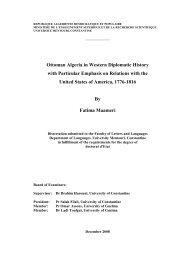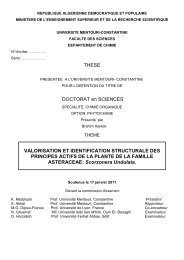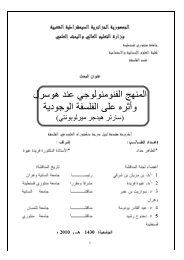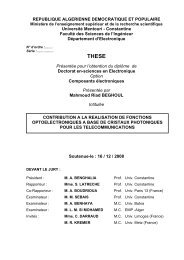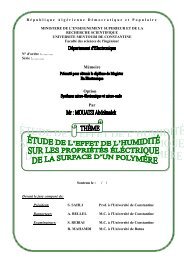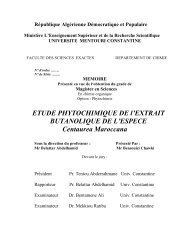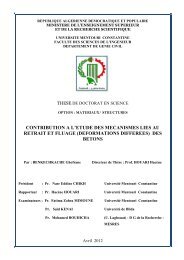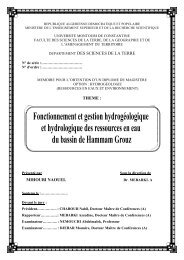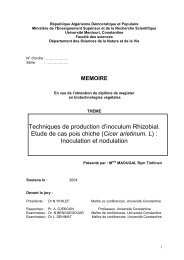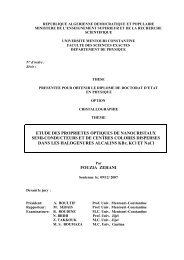- Page 1 and 2: N° d’ordre : 79 / T.E / 2007 Sé
- Page 3 and 4: 3. 3. 8. Gènes et biologie molécu
- Page 5 and 6: Résultats et discussion 1. Analyse
- Page 7: Nom : KHARROUB Date de soutenanace
- Page 11 and 12: Listes des figures Figure 1. Habita
- Page 13 and 14: Figure 36. Photomicrographies élec
- Page 15 and 16: Tableau 31. Taux d’hybridations A
- Page 17 and 18: A ADN ADNr 16S ARN ARNr ARNt ATP Aw
- Page 19 and 20: 1 Introduction générale En dehors
- Page 21 and 22: 3 Introduction générale position
- Page 23 and 24: 5 Revue bibliographique Figure 2. L
- Page 25 and 26: 7 Revue bibliographique majorité d
- Page 27 and 28: 9 Revue bibliographique De nombreus
- Page 29 and 30: 11 Revue bibliographique Au sein de
- Page 31 and 32: 13 Revue bibliographique Antón et
- Page 33 and 34: 15 Revue bibliographique La seconde
- Page 35 and 36: 17 Revue bibliographique C’est un
- Page 37 and 38: 19 Revue bibliographique L’organi
- Page 39 and 40: 21 Revue bibliographique essentiell
- Page 41 and 42: 23 Revue bibliographique mannosyl-6
- Page 43 and 44: 25 Revue bibliographique tandis que
- Page 45 and 46: 27 Revue bibliographique La présen
- Page 47 and 48: 29 Revue bibliographique c’est la
- Page 49 and 50: 3. 3. 8. Gènes et biologie molécu
- Page 51 and 52: 33 Revue bibliographique génome d
- Page 53 and 54: 35 Revue bibliographique de transpo
- Page 55 and 56: 4. 3. Physiologie 37 Revue bibliogr
- Page 57 and 58: 39 Revue bibliographique A l’exce
- Page 59 and 60:
41 Revue bibliographique nucléotid
- Page 61 and 62:
43 Revue bibliographique famille de
- Page 63 and 64:
5. Biotechnologies des procaryotes
- Page 65 and 66:
47 Revue bibliographique trouvé un
- Page 67 and 68:
49 Revue bibliographique siècle po
- Page 69 and 70:
51 Revue bibliographique classifica
- Page 71 and 72:
53 Revue bibliographique culture re
- Page 73 and 74:
55 Revue bibliographique hypothèse
- Page 75 and 76:
57 Revue bibliographique Figure 12.
- Page 77 and 78:
1. Echantillonnage 59 Matériel et
- Page 79 and 80:
Figure 15. Photographies in situ de
- Page 81 and 82:
Tableau 6. Souches de référence u
- Page 83 and 84:
65 Matériel et Méthodes Les milie
- Page 85 and 86:
67 Matériel et Méthodes 20 ml de
- Page 87 and 88:
Technique 1 (Marmur, 1961) 69 Maté
- Page 89 and 90:
3. 7. 3. Détermination du contenu
- Page 91 and 92:
Tableau 9. Cycles employés. Paires
- Page 93 and 94:
75 Matériel et Méthodes Les align
- Page 95 and 96:
77 Matériel et Méthodes * : la so
- Page 97 and 98:
79 Matériel et Méthodes doubles b
- Page 99 and 100:
81 Résultats et discussion Le but
- Page 101 and 102:
1. Morphologie des souches d’halo
- Page 103 and 104:
85 Chapitre 1 : Résultats et discu
- Page 105 and 106:
87 Chapitre 1 : Résultats et discu
- Page 107 and 108:
Tableau 14. Croissance à différen
- Page 109 and 110:
Tableau 15. Croissance à différen
- Page 111 and 112:
Tableau 16. Spectre de température
- Page 113 and 114:
Tableau 18. Utilisation des sucres.
- Page 115 and 116:
Tableau 19. Utilisation des alcools
- Page 117 and 118:
99 Chapitre 1 : Résultats et discu
- Page 119 and 120:
Tableau 22. Production d’acides
- Page 121 and 122:
Tableau 23. Caractérisation biochi
- Page 123 and 124:
Tableau 24. Résultats de la sensib
- Page 125 and 126:
5. Chimiotaxinomie 5. 1. Analyse de
- Page 127 and 128:
109 Chapitre 1 : Résultats et disc
- Page 129 and 130:
111 Chapitre 1 : Résultats et disc
- Page 131 and 132:
Absorbance (D.O.) 0,095 0,085 0,075
- Page 133 and 134:
115 Chapitre 1 : Résultats et disc
- Page 135 and 136:
117 Chapitre 1 : Résultats et disc
- Page 137 and 138:
Tableau 28. Affiliation phylogéné
- Page 139 and 140:
121 Chapitre 1 : Résultats et disc
- Page 141 and 142:
123 Chapitre 1 : Résultats et disc
- Page 143 and 144:
125 Chapitre 1 : Résultats et disc
- Page 145 and 146:
0,02 26 37 31 85 55 100 127 Chapitr
- Page 147 and 148:
129 Chapitre 1 : Résultats et disc
- Page 149 and 150:
131 Chapitre 1 : Résultats et disc
- Page 151 and 152:
133 Chapitre 1 : Résultats et disc
- Page 153 and 154:
135 Chapitre 1 : Résultats et disc
- Page 155 and 156:
137 Chapitre 1 : Résultats et disc
- Page 157 and 158:
Description de Halorubrum ezzemoule
- Page 159 and 160:
141 Chapitre 1 : Résultats et disc
- Page 161 and 162:
143 Chapitre 1 : Résultats et disc
- Page 163 and 164:
0,02 145 Chapitre 1 : Résultats et
- Page 165 and 166:
147 Chapitre 2 : Résultats et disc
- Page 167 and 168:
149 Chapitre 2 : Résultats et disc
- Page 169 and 170:
151 Chapitre 2 : Résultats et disc
- Page 171 and 172:
153 Chapitre 2 : Résultats et disc
- Page 173 and 174:
155 Chapitre 2 : Résultats et disc
- Page 175 and 176:
157 Chapitre 2 : Résultats et disc
- Page 177 and 178:
159 Chapitre 2 : Résultats et disc
- Page 179 and 180:
161 Chapitre 2 : Résultats et disc
- Page 181 and 182:
163 Chapitre 2 : Résultats et disc
- Page 183 and 184:
165 Conclusion générale et Perspe
- Page 185 and 186:
167 Conclusion générale et Perspe
- Page 187 and 188:
169 Références bibliographiques A
- Page 189 and 190:
171 Références bibliographiques C
- Page 191 and 192:
173 Références bibliographiques g
- Page 193 and 194:
175 Références bibliographiques G
- Page 195 and 196:
177 Références bibliographiques I
- Page 197 and 198:
179 Références bibliographiques K
- Page 199 and 200:
181 Références bibliographiques L
- Page 201 and 202:
183 Références bibliographiques M
- Page 203 and 204:
185 Références bibliographiques O
- Page 205 and 206:
187 Références bibliographiques R
- Page 207 and 208:
189 Références bibliographiques g
- Page 209 and 210:
191 Références bibliographiques V
- Page 211 and 212:
193 Références bibliographiques X
- Page 213 and 214:
Annexe2 : Tableau 4. Bactéries hal
- Page 215 and 216:
Tableau 4. Bactéries halophiles as
- Page 217 and 218:
80 ml de la solution A 40 ml d’ac
- Page 219 and 220:
Tableau 10. Origine des séquences
- Page 221 and 222:
Annexes CGTCCGGTGAAAACCACGTGGCTTGGG
- Page 223 and 224:
Séquence de l’ADNr 16S de la sou
- Page 225 and 226:
Annexes CATCGGGAAATCCGCGCGCTTATCTCT
- Page 227 and 228:
Tableau 27. Caractéristiques diff
- Page 229:
Annexe 10. Courbes de quantificatio



